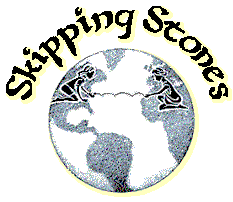From the Editor
Do you find that writing is a challenge? Do you get a "writer's block" when you sit down to write your term papers or class reports?
Over the last two decades, I've found that one of the challenges of writing a Letter from the Editor is that it needs to be timely as well as timeless. Because, although I'm working on this editorial just after Thanksgiving, most of you won't see it until January, and some will read it by Valentine's Day or perhaps in Spring! So, I need to write something that will be useful for a long while. Now that takes some hard thinking, right? Actually, all good things take time in life!
I often contemplate the topic and the approach I might take to write about it during my daily, unhurried, walking meditations (like the Buddhist teacher, Thich Nhat Hanh suggests). I also think about what I am writing while falling asleep at night, or as I wake up in the morning. I welcome suggestions and constructive criticisms from our editorial interns and staff. I reread and edit my writing several times before I say, "That's it."
What we do today paves the way for tomorrow. Even sports and hobbies help us in our future as adults. Have you observed that cubs, kittens and puppies learn by playing and observing others? We study math, sciences, languages, literature, humanities, arts, etc. because we can use the knowledge, skills and training as we study or practice our future professions—as accountants, artists, construction workers, doctors, engineers, nurses, teachers or technicians—and contribute to the family, community and society. (True, many of our efforts are focused on acquiring skills that would bring us a good job and income!)
Often, we think of only now—today, tomorrow, our next vacation or the next year. And, we tend to forget the past. If we could remember our history and truly understand our past—the mistakes, the decisions that defined our destiny and lessons we should have learned, we would surely make wise decisions!
At times, you may hear that many Native elders and councils made their decisions only after reflecting on how those decisions would affect the seven generations in the future. They were thinking long term, 100 or 150 or 200 years after their times.
When we focus on our studies, acquiring skills, we are preparing for the future. When we plant trees and protect natural places, conserve energy by reducing use of gasoline, oil, coal, wood, or water, we are thinking of our common future. When we buy energy-efficient appliances, reusable and long-lasting things (rather than disposable, one-use things like paper/plastic cups and plates, etc.), we are thinking of our long-term impact on the environment. When we reject the growing tradition of the birthday party goodie bags—full of short lifespan, cheap, plastic toys and trinkets—we are thinking of the future generations, because throw-away things are a huge burden on the biosphere. When we remember to take our own containers and bags to the store, that's thinking of the future.
We buy things because we think we want them. But after a week or two, we may discover that we no longer care for them and they may get tossed in a closet or in the garage (aka 'garbage'!) to collect dust! There is an age-old saying in Marathi, my mother tongue in India. It says, "Navyaché nau deevus!" (Newness lasts for only nine days.) So, if your parents did not give in to your demands for a new toy or gadget, don't think they are being mean to you. Perhaps they are thinking of your future, our common future. It is true that often we adults forget the passion, desires and drives that you, our young ones, our common future, have. For this, we ask for your understanding and forgiveness.
Welcome to 2010, the New Year for now! Soon, it will be the Year of Tiger, the Chinese New Year, which falls on Valentine's Day, 14 February and then Navrouz, the Persian New Year, which is celebrated in Central Asia near Spring Equinox each year
Arun Toke, editor





